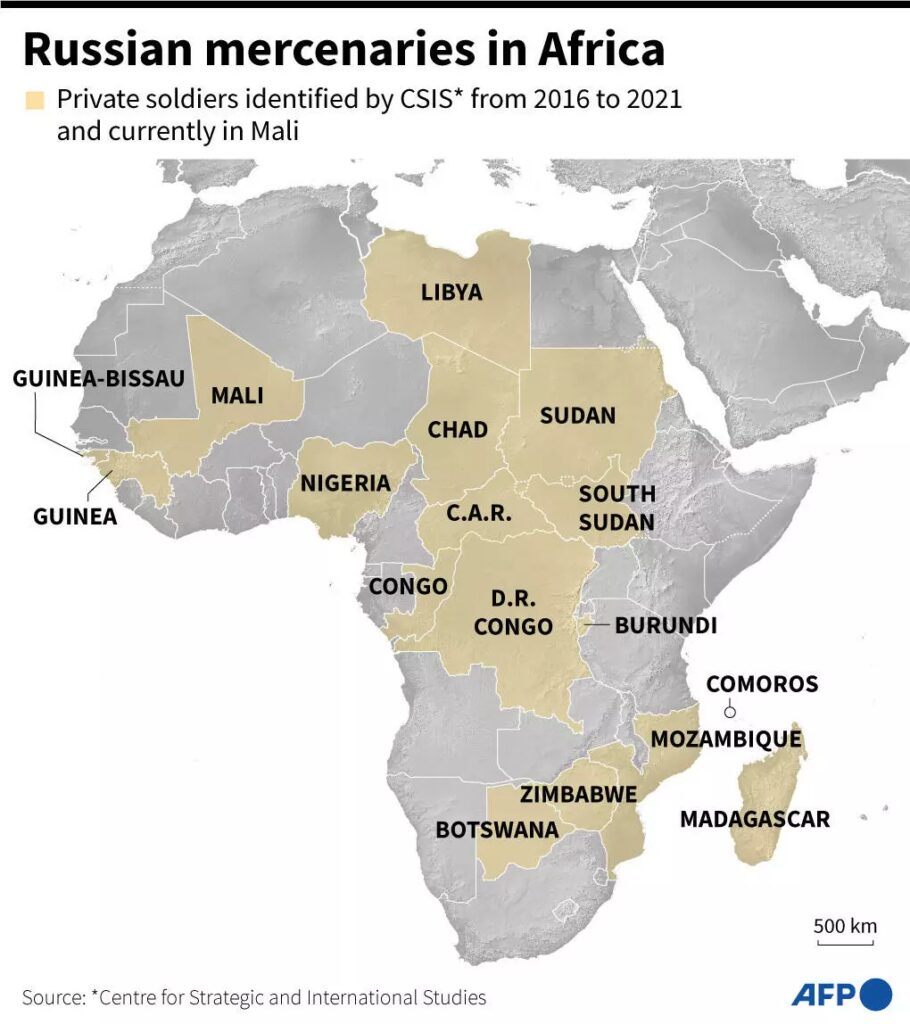While announcing on Thursday that France would withdraw its troops from Mali, President Emmanuel Macron made his strongest condemnation yet of the shadowy Russian mercenary group Wagner whose alleged arrival in West Africa has infuriated Paris.
The French leader made clear that a suspected deal between the Malian military regime and Wagner was a crucial factor in pushing Paris to withdraw its 2,400 troops after a nine-year deployment against local jihadist groups.
Macron said that Wagner was “arriving in Mali with predatory intentions, but why?”
“Because the junta which is in power after two coups d’etats considers them to be the best partners they can find to protect their power, not to fight against terrorism,” Macron said.
He said Wagner was previously guilty of “taking resources that should belong to the Libyan people” after their deployment in Libya and had also been responsible for “awful abuses against the civilian population” in the Central African Republic.
In Mali, they were “essentially there to secure their own business interests and protect the junta itself,” Macron added, calling on Mali’s leaders to explain how they were paying the secretive organisation reportedly founded by oligarch Yevgeny Prigozhin.
Stephen Townsend, head of the US Africa command, said earlier this month that he believed Mali was paying Wagner $10 million a month, partly in gold and gemstones.
Mali’s military rulers, who seized power in 2020, have always denied any such deal, but Macron said that the Russian group had deployed “around 800” fighters in the landlocked country that is home to growing al-Qaeda and Islamic State-aligned groups.
UK Defence Minister Ben Wallace said Thursday that Wagner was “effectively in bed with the junta.”
- Russian denials –
Mali’s leaders admit to having relations with the Russian state, which they say has provided military trainers.
Mali was “only involved in a state-to-state partnership with the Russian Federation, its historical partner”, according to a statement from the government in Bamako at the end of December.
The regime has also stressed that they were left with no choice but to look for new security partners after Macron announced in 2021 that France would be drawing down its forces in the Sahel region.
Malia’s interim Prime Minister Choguel Kokalla Maiga accused Paris of a “sort of abandonment” at the UN general assembly in September last year.
Western officials have claimed for months that Russian transport planes have been spotted delivering Wagner fighters and arms, as well as Russian geologists known for their association with the group.

Russian President Vladmir Putin denies any link with Wagner despite Western suspicions that it is a Trojan Horse used to advance Moscow’s interests, including in Ukraine.
“The Russian Federation has nothing to do with private military organisations that are operating in Mali,” Putin told a press conference with Macron in Moscow on February 7.
- Abuses –
The existence of Wagner is hard to pin down, with investigators unable to find formal traces such as company registration, tax returns or an organisational chart.
When the EU wanted to sanction it in 2020 for “serious human rights abuses”, it targeted Prigozhin, an oligarch nicknamed “Putin’s chef” because his company once catered for the Kremlin.
Jason Blazakis from the New York-based Soufan Group think-tank said that Wagner was following in the footsteps of other mercenary operators in Africa, notably South Africans.
“The Wagner folks are walking through a door that has long been open to their ilk,” he added.
The Center for Strategic and International Studies (CSIS), a think-tank in Washington, has found evidence since 2016 of Russian soldiers of fortune in more than a dozen countries including Sudan, Madagascar, Botswana, Burundi and the Democratic Republic of Congo.
Macron had previously condemned Wagner’s role in the Central African Republic (CAR), saying last May that it was exploiting mines and that CAR President Faustin-Archange Touadera was now a “hostage”.
UN chief Antonio Guterres this week denounced “human rights abuses” by CAR’s army and its foreign supporters, an allusion to Wagner.
Djallil Lounnas, a researcher at Morocco’s Al Akhawayn university, said that part of the appeal of Wagner is that there is less concern about the scrutiny that comes with working for Western partners.
“Russia has its interests. It doesn’t ask questions,” he told AFP.
But Wagner’s results do not always measure up to the hopes invested in them.
In Libya, its mercenaries are thought to have suffered heavy losses while working for warlord Khalifa Haftar during his unsuccessful attempt to conquer the capital Tripoli.
And in Mozambique, they retreated in the face jihadists linked to the Islamic State.
 Eurasia Press & News
Eurasia Press & News




